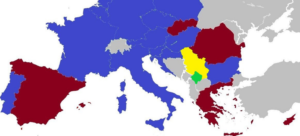From Crisis to Convergence: A Strategy to Tackle Instability in the Balkans and its Source

This report offers a near-term strategy to reverse — not just contain — the alarming deterioration in the Balkans, and growing Russian and Chinese influence in the region.
At the core of the strategy is a straightforward contention: the three-decade, violent dissolution of Yugoslavia can be brought to an end where it started, in Kosovo. This claim extends to the still-unfolding crisis in Bosnia-Herzegovina. Last week’s strong, timely US sanctions, even if applied to other corrupt and divisive figures in the country, will not cure Bosnia’s decades-long, unsustainable paralysis.
On the other hand, recognition of the Republic of Kosovo by the four NATO members that do not recognize Kosovo – Spain, Slovakia, Romania and Greece – would transform the moribund EU-led Dialogue between Belgrade and Pristina, and the entire region, including Bosnia-Herzegovina.
Convincing these four states (‘the NATO 4’) – and a fifth, Cyprus, which is a fellow member of the EU, but not NATO – to recognize Kosovo is not so straightforward. It will require a determined effort by the Biden Administration, in tandem with key allies, to convince the non-recognizers to change their stance. Policymakers across the Atlantic will only invest in this endeavor if they are convinced of the necessity, wider benefits and viability of this approach – and if they accept that their current approach will not work. That is the multiple aim of this report, and what accounts for its length.
Co-authors:
Edward P. Joseph, (US), Senior Fellow, SAIS FPI
Dr. Branislav Radeljic (Serbia), Professor, Necmettin Erbakan University, Turkey; Antonio de Nebrija University, Spain
Dr. Lulzim Peci (Kosovo), Executive Director, KIPRED
Dr. Iulia Joja (Romania), Adjunct Professor, Georgetown University
Jan Cingel (Slovakia), Founder and CEO, Strategic Analysis Think Tank
Dowload the full report HERE: From Crisis to Convergence: A Strategy to Tackle Instability in the Balkans and its Source
Event: The Balkans in 2022: How bad can it get? Is a Breakthrough Possible? (15.2.2022)
How alarming is the situation in the Balkans? Is it possible not just to arrest the still-unfolding crises, but actually to reverse the deterioration? Join us as four leading experts from across the region discuss the outlook for the region – and debate whether the recent strategy from SAIS FPI and Wilson Center offers a way out of crisis. The report, ‘From Crisis to Convergence: A Strategy to Tackle Instability in the Balkans at its Source’, argues that there is an alternative to serial crisis management. The co-authors –from Serbia, Kosovo, Slovakia, Romania and the US — will respond directly to the critique of the leading experts. The aim is a timely discussion that goes beyond the latest appeal from international officials and examines why the US and EU have struggled for so long in a region where they – not Russia and China – hold the strategic advantage.
This special event was co-sponsored by Johns Hopkins SAIS Foreign Policy Institute (host); Wilson Center; European Council on Foreign Relations; Balkan Insider; Transatlantic Leadership Network.

Contact us